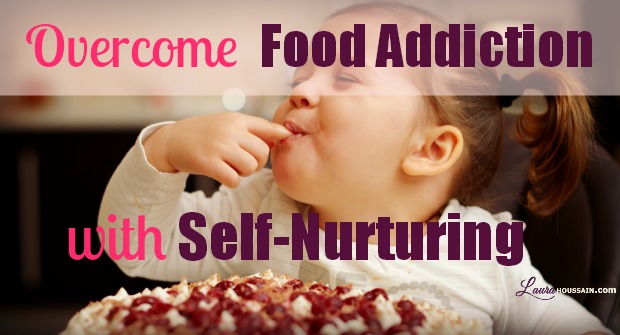Is Food Addiction really a bad thing?
Remember that wave of celebs cheating (and getting caught), which led to that flood of check-ins to rehab for the salacious condition called sex addiction.? If you were like me, you cupped your chin and thought, well that’s convenient — you get caught with your pants puddled around your ankles and suddenly you’re a sorry, sad sex junkie. Well, the term food addiction is cloaked in similar skepticism. Can we really be addicted to food? It remains a controversy in the medical community whether food addiction is a real condition or just a crutch.
The Controversy
Addiction, dependence, habit, jones, monkey — call it what you will — is defined in the medical dictionary as the “compulsive physiological need for and use of a habit-forming substance (such as heroin, nicotine or alcohol) characterized by tolerance and by well-defined physiological symptoms upon withdrawal.”
The heated debate centers on the question of brain involvement. And whether a food can fundamentally work the same way as a substance classically associated with addiction.
“It’s a contentious term,” says Jennie Kramer, MSW, LCWS, founder and executive director of New York-based Metro Behavior Health Associates Eating Disorder Treatment Centers. “We just don’t know, the jury’s still out. Yet most current thinking must include the idea that addiction may not just be to a substance.”
Food: It’s An Addiction
Some emerging data suggests that a neurological reaction may occur when sugar is consumed, and that food addiction may exist in some people. Animal and human experiments have found that highly palatable foods (high in fat, salt, sugar), for some, may trigger the same reward and pleasure centers that addictive drugs like cocaine and heroine do, according to Web MD. And the reward sensations may actually block feelings of fullness, leading one to continue eating whether or not he/she is hungry.
An October 2013 small-animal study presented at the annual Society For Neuroscience conference found that in rats, the brain’s pleasure center (nucleus accumbens) was activated as much by Oreo cookies as it was by morphine or cocaine.
“Our research supports the theory that high-fat/high-sugar foods stimulate the brain in the same way that drugs do,” said the lead researcher, Connecticut College professor Joseph Schroeder.
Food: Not An Addiction
Not so fast, say other scientists. “I think from the perspective of DSM and diagnosis and classification, the main message to clinicians is to stop speculating and overdiagnosing food addiction,” said Hans-Ulrich Wittchen, PhD, who moderated a panel on the topic of food addiction at the October 2013 European College of Neuropsychopharmacology conference, reports Medscape.
“It’s too early, too premature. We should limit to what we know: binge eating is a stable behavior and there should be intervention. Whether behavioral eating disorders are part of food addiction syndrome we don’t think so,” says Dr. Wittchen. “Is this a brain disease by definition? I don’t think so. That goes too far.”
Read more: ANGRY GRANDMAS IN ARMS PROTEST ABSURD SEC CLAIM: GIFTING STOCKS AWAY ILLEGAL IN AMERICA?
DSM refers to the Diagnostic and Statistical Manual of Mental Disorders. Published by the American Psychiatric Association, the book identifies standard criteria for the classification of mental disorders. Historically it has been updated only once every six to 16 years.
It made news when Binge Eating Disorder (BED) recently was included for the first time in the fifth edition of the Diagnostics and Statistical Manual of Mental Disorders book (DSM-5). Research has shown that up to 20 percent of obese people have BED.
Yet Dr. Suzanne Dickson said at the European College conference that food addiction is a term created by the media and some sufferers in an attempt to explain the behavior.
“The evidence itself is insufficient to support the idea that food addiction is a mental disorder. We do not have a clinical syndrome of food addiction so far, and it is very important to establish the validity of a condition before putting it forward for inclusion in the DSM.”
Now that obesity has reached global epidemic proportions, it is no longer something scientists can neglect to look at. And many are now dedicating research to understanding the mechanics of overeating and uncontrolled food consumption.
But Not So Black and White
Neuroscientist Dr. Dickson did go on to say that, while more evidence is needed, “A subgroup of obese patients have addictive-like properties with regard to overeating but this doesn’t automatically mean addicted.”
There is no solid evidence that a food, ingredient, combination of ingredients or additive — except caffeine — causes addiction, says Dr. Dickson. Whereas scientists know for certain that drugs engage the brain and cause addiction.
“But if we move away from food and concentrate on individuals,” she adds, “we can see certain individuals express addictive behaviors.”
Where’s the Research?
The Yale Rudd Center For Food Science and Policy is pioneering much of the research done in this area. In one study published in the Archives of General Psychiatry, scientists observed the brain response when study participants anticipated receiving a chocolate milkshake. Using functional magnetic resonance imaging (fMRI), the researchers found that those who had a rate high on the food-addiction scale (developed by Yale Rudd) responded to the drink differently than those who had a low rate.
Why Does It Matter?
Many believe if food addiction were officially classified as a condition, then the stigma about being overweight from society would decrease.
“There is still a sense in society that overweight people are sloppy and lazy and that they just don’t care,” says Kramer.
Legitimizing the term “food addiction” would also allow for more treatment reimbursement, she adds.
Read more: WHY ARE WOMEN FILING SO MANY SEXUAL HARASSMENT LAWSUITS, GREEDY OR JUST?
Officiating food addiction could also have big public health implications. High-calorie, nutrient-empty foods are usually low-cost and more appealing to lower socioeconomic groups. It would also raise new questions about the best mode of treatment.
Food Abstinence = Death
The course of treatment for alcohol and drug addiction, though, is abstinence.
“The heart of the matter,” says Kramer, “is that we cannot give up food. But rather, we have to establish a life-long relationship with food.”
Obesity Treatments
In the case of bariatric surgery, in a large percentage of cases, says Kramer, those who had surgery gain the weight back and more, within two to three years,.
“The is very hard to do and tells us what happens when you don’t get at the root of the relationship with food, when you don’t do the hard work of changing behavior.”
Food Addicts Anonymous (yes, there is such a thing, and it offers “tools of recovery”) recommends cutting off sugar, wheat and flour. Yet, when people simply try hard to stop eating certain foods, they can get on an up-and-down weight roller coaster, Chevese Turner, founder of the Binge Eating Disorder Association, told Psychology Today .
Why? You guessed it. Because they neglected to address the deeper issues driving them to certain foods, such as trauma or significant family issues. And hard, cold-turkey abstinence often fails.
How to Dig Deeper
Getting to the core of the overeating issue involves identifying patterns, and when in the past they started, says Kramer. “Looking at decisions made in the past, made over the course of a life. Giving up on dieting. Seeking targeted nutritional training and meal plans you can live with … forever, not just a few weeks.”
She adds that sometimes medication may be warranted to treat underlying anxiety and/or depression issues.
What Could Be Signs, If Food Addiction Is Real?
While academics and clinicians debate the merits of labeling food addiction scientifically legitimate, Yale Rudd Center For Food Science and Policy has wasted no time developing a questionnaire aimed at identifying possible signs of a food addiction.
The survey identifies the following as among possible signs of food addiction:
*Avoiding social or professional situations where certain foods will be available from fear of overeating
*Experiencing withdrawal symptoms when you cut down on certain foods (except caffeine) such as anxiety and agitation, eating the same amount over time fails to provide the same pleasure
*Eating food because of depression, anxiety, self-loathing or guilt to reduce negative emotions
While we can’t yet agree on the semantics or mechanisms at work, what’s clear is that obesity is very much a global health threat that must continue to be explored.






